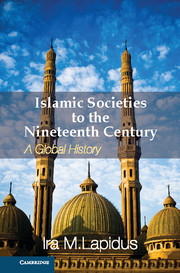Book contents
- Frontmatter
- Contents
- List of Illustrations
- List of Figures
- List of Maps
- List of Tables
- Preface
- Acknowledgments
- Acknowledgments to the first edition of A History of Islamic Societies
- Acknowledgments to the second edition of A History of Islamic Societies
- Publisher's Preface
- Introduction to Islamic Societies
- Part I The Beginnings of Islamic Civilizations
- Part II From Islamic Community to Islamic Society
- Part III The Global Expansion of Islam from the Seventh to the Nineteenth Centuries
- Chapter 25 Introduction: Islamic Institutions
- The Western Islamic Societies
- Chapter 26 Islamic North Africa to the Thirteenth Century
- Chapter 27 Spanish-Islamic Civilization
- Chapter 28 Libya, Tunisia, Algeria, and Morocco from the Thirteenth to the Nineteenth Centuries
- Chapter 29 States and Islam: North African Variations
- Islam in Asia
- Islam in Africa
- Conclusion
- Glossary
- Bibliography
- Annotated Bibliography from A History of Islamic Societies, 2nd Edition
- Index
Chapter 29 - States and Islam: North African Variations
Published online by Cambridge University Press: 05 February 2013
- Frontmatter
- Contents
- List of Illustrations
- List of Figures
- List of Maps
- List of Tables
- Preface
- Acknowledgments
- Acknowledgments to the first edition of A History of Islamic Societies
- Acknowledgments to the second edition of A History of Islamic Societies
- Publisher's Preface
- Introduction to Islamic Societies
- Part I The Beginnings of Islamic Civilizations
- Part II From Islamic Community to Islamic Society
- Part III The Global Expansion of Islam from the Seventh to the Nineteenth Centuries
- Chapter 25 Introduction: Islamic Institutions
- The Western Islamic Societies
- Chapter 26 Islamic North Africa to the Thirteenth Century
- Chapter 27 Spanish-Islamic Civilization
- Chapter 28 Libya, Tunisia, Algeria, and Morocco from the Thirteenth to the Nineteenth Centuries
- Chapter 29 States and Islam: North African Variations
- Islam in Asia
- Islam in Africa
- Conclusion
- Glossary
- Bibliography
- Annotated Bibliography from A History of Islamic Societies, 2nd Edition
- Index
Summary
From the origins of the Islamic era to the nineteenth century, the history of North African society turned on two essential motifs: state formation and Islamization. The Arab conquests gave new impetus to state formation and to the organization of North African society into Muslim communities. Tunisia in the eighth century, Morocco in the eleventh, and Algeria in the sixteenth acquired territorial identity and state regimes. The conquests also led to the institutionalization of Islam for the masses of the population. From the eighth century, the Maliki school of law became rooted throughout North Africa and remained the mainstay of legal administration, education, and state legitimization until the nineteenth century. From about the twelfth century, Sufis became the chieftains of rural communities in Tunisia, Algeria, and Morocco and the leaders of tribal coalitions, in parallel with and in opposition to states. Much of the history of North Africa from the thirteenth to the nineteenth centuries may be defined in terms of the relations between state and Sufi forces. Finally, the Arab conquests also gave North Africa an Arab identity due to successive waves of Arab migration, and Arab dominance of states. Large parts of southern Tunisia, Algeria, and Morocco, however, were primarily Berber. Only in the twentieth century would Arabic become the universal language of societies that had been Muslim since the Almohad era.
Each society, however, exhibited its own variations on state, religious, and tribal institutions. At the time of the Arab conquests, Tunisia was already the center of a developed civilization and remained throughout its history a society marked by a highly developed agricultural and commercial economy governed by an aristocracy of landowners, merchants, and urban intellectuals. Tunisia in the early Muslim era, like the Middle East, maintained its inherited institutional base but accepted an Islamic version of ancient civilization. Under the early Arab and Aghlabid governors a caliphal type of administration and the Maliki school of law flourished. The Hafsid regime adopted the sultanal type of administration and ʿulamaʾ and Sufi forms of Islam. With the Ottoman conquest at the end of the sixteenth century, Ottoman janissary and administrative institutions and the Ottoman type of ʿulamaʾ bureaucracy modified the structure of the Tunisian state. Throughout this era Tunisia maintained its state institutions, despite a large pastoral and tribal population in the southern parts of the country, and despite constant fluctuations in the balance of power between the state and the tribal parts of the society. Until the nineteenth century Tunisia was in all respects a provincial variant of the Middle Eastern Islamic world.
- Type
- Chapter
- Information
- Islamic Societies to the Nineteenth CenturyA Global History, pp. 421 - 424Publisher: Cambridge University PressPrint publication year: 2012



